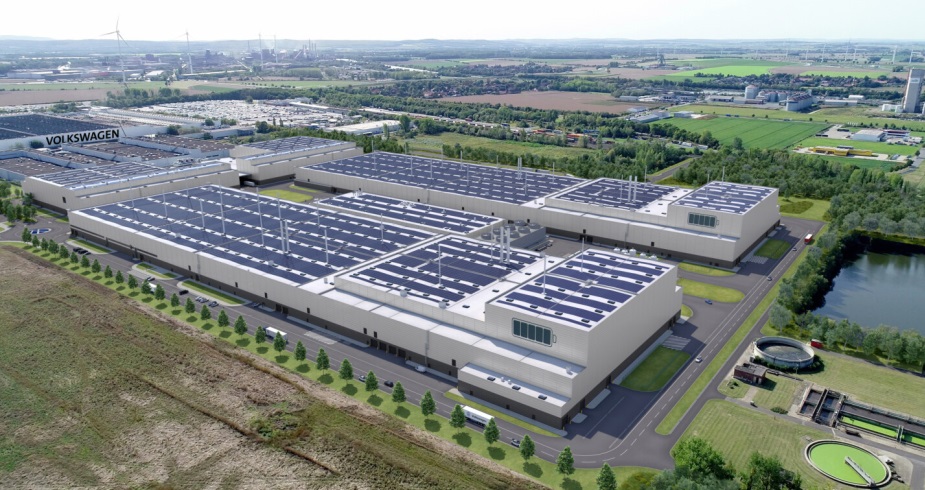During the period from January to July 2024, 815,399 electric vehicles (EVs) were registered in the European Union (EU) according to the European Automobile Manufacturers’ Association (ACEA), providing strong evidence of the accelerated transition to electromobility.
This, coupled with the ongoing competition with China, is why it is anticipated that around 250 battery factories will be established in Europe over the next ten years.
By the end of last year, approximately 20 projects had been confirmed in European states such as France, Germany, Italy, and the United Kingdom.
In the early months of this year, new announcements have emerged.
Where will these new facilities be located? Below, Mobility Portal Europe presents a list.
Germany
Daimler Truck has officially inaugurated the Battery Technology Center (BTC) at its Mercedes-Benz plant in Mannheim, a year after its groundbreaking.
The BTC, now fully operational, spans over 10,000 square meters and integrates both the development and production of battery technologies.
It includes facilities for producing battery cells and prototypes, preparing for future large-scale production.
Hungary
In Debrecen, Hungary, Chinese company CATL is constructing a battery plant with a 7.3 billion euro investment.
This facility, with a production capacity of 100 gigawatt-hours (GWh), began construction in 2022.
The plant is expected to commence production within two to three years, marking a significant milestone in expanding battery production capacity in Europe.
This project not only reinforces Debrecen’s position as a key hub in the battery industry but also contributes significantly to the local economy and job creation in the region.
Additionally, in the same locality, Chinese firm EVE Power has announced a one billion euro investment for the construction of another battery plant, with a capacity of 28 GWh.
This project was confirmed in May by the Hungarian Foreign Minister, highlighting its strategic relevance for the country.
EVE Power’s new plant will not only increase battery production capacity on the continent but also contribute to the industrial development of the region and the creation of numerous jobs.
Spain
PowerCo, a subsidiary of Volkswagen Group, is moving ahead rapidly with its battery cell gigafactory project, set to begin foundational work and erect its first pillars this autumn.
The plant, expected to employ around 1,500 workers, is on track to start operations in 2026.
This progress was highlighted during a recent site visit by key figures, including the President of the Generalitat, Carlos Mazón, and PowerCo’s CFO, Javier Rivera.
The foundation work is currently out for tender, with most concrete prefabrications awarded to a company in Buñol, Valencia.
Mazón underscored the “historic investment” of over 600 million euros by the regional government, contributing to infrastructure projects like the intermodal station and the Battery Campus.
Sweden
In Borlänge, Northvolt’s plant is scheduled to begin production in 2025.
This facility is expected to be fully operational by 2030, with an ambitious target of reaching a capacity of 150 GWh.
Additionally, in Gothenburg, the aforementioned firm has invested 30 billion Swedish kronor (approximately three billion euros) in the construction of another plant.
This facility will also begin production the following year and has a projected capacity of 50 GWh.
Switzerland
In the town of Frauenfeld, SCB has high expectations for its new battery plant, valued at 775 million Swiss francs (approximately 880 million dollars).
The plant is designed to reach full operational capacity by 2030, with an ambitious production target of 7.6 GWh.
This project is a key component of SCB’s expansion strategy, aiming to strengthen its presence in the growing European market for electric vehicle batteries.
Once operational, this plant will not only meet current battery demand but also be prepared to adapt to future market needs, ensuring SCB’s competitiveness in the global battery industry.
Slovakia
Currently, there is a major gigafactory project in development in Slovakia.
This is the Inobat project, located in Vieska nad Zitavou.
The plant is projected to have a capacity of 40 GWh by 2030, with the potential to expand to 100 GWh.
The estimated investment for this project is four billion euros, and the factory is currently under construction, therefore production is expected to begin in 2025.
Among the partners for this project are Volkswagen, InoBat Auto, and CATL.
This facility will focus on producing state-of-the-art lithium-ion batteries for electric vehicles and is expected to create around 4,000 jobs.
Additionally, there are other projects in the early study or development phase.
Britishvolt, a British company, is considering building a gigafactory in Slovakia with a potential capacity of up to 8 GWh.
Furthermore, Enel, the Italian company, is exploring the possibility of establishing a factory in the country with a projected capacity of up to 50 GWh.
Thus, Slovakia is positioning itself as a significant center for electric vehicle battery production in Europe.
The country offers skilled labor, a strong presence in the automotive industry, and good access to the electricity grid, making it an attractive location for such investments.
Poland
Impact Clean Power Technology, a Polish company part of the Grenevia Group, has announced ambitious plans for a large-scale battery factory for EVs and energy storage.
Named GigafactoryX, this facility will be located in Pruszków, near Warsaw, and is poised to be one of the largest of its kind in Europe.
The plant will cover almost 175,500 square feet (16,300 square meters) of production area.
With this expansion, Impact is expected to increase its production capacity to 1.2 GWh this year and to over 4 GWh by 2027.
Additionally, the facility will include a battery testing center and an advanced research and development center.
The production line for the first phase will allow the manufacturing of 16,000 units of battery systems in 2024, compared to the current capacity of around 2,500 units.
This line will feature full automation of processes such as robotic component assembly, batch processing, screwing, visual inspection, and a variety of tests.
Portugal
Chinese manufacturer Aviation Lithium Battery Technology (CALB) has announced ambitious plans to establish an electric vehicle battery factory in Sines, Setúbal district, with the aim of starting operations in 2025.
A company representative, Nuno Gameiro, stated that the CEO has indicated “late 2025” as the target date for the start of operations for this future facility.
The factory should be operational by that year so that the batteries produced in Sines can be shipped to Europe and made available for installation in various vehicles by the end of the first quarter of 2026.
Construction of this first CALB factory will take place in multiple phases.
In the first phase, the industrial unit will be built on 50 of the available 100 hectares of land.
This initial investment stage is intended to meet the current order book that the company has in Europe, although the exact value of this investment was not disclosed.
In a second phase, planned for 2028, the company would expand its facilities to occupy the entire 100 hectares of land.
This extension will allow increasing the factory’s production capacity from 15 to 45 GWh, consolidating its position in the European electric vehicle battery market
Norway
Morrow Batteries has launched Norway’s first battery cell production site on the south coast, marking Europe’s first gigawatt LFP (lithium iron phosphate) factory.
The start-up, founded in 2020, plans to deliver its initial units by the end of the year and gradually scale up production.
The factory in Arendal aims to leverage Norway’s green energy and proximity to European markets seeking alternatives to Chinese batteries.
CEO Lars Christian Bacher emphasized the focus on starting sales by year-end, with initial efforts directed at refining processes and stabilizing production.
Morrow has secured a 5.5 GWh delivery agreement over seven years with Nordic Batteries, thus the factory’s annual output of one-gigawatt hour will produce around three million cells, enough to power 20,000 smaller electric vehicles.
However, larger automotive contracts are still years away as the company scales its production.
Early investors in Morrow include A Energi, ABB, Siemens, Danish pension fund PKA, and the Norwegian state-owned green investment firm Nysnø.








